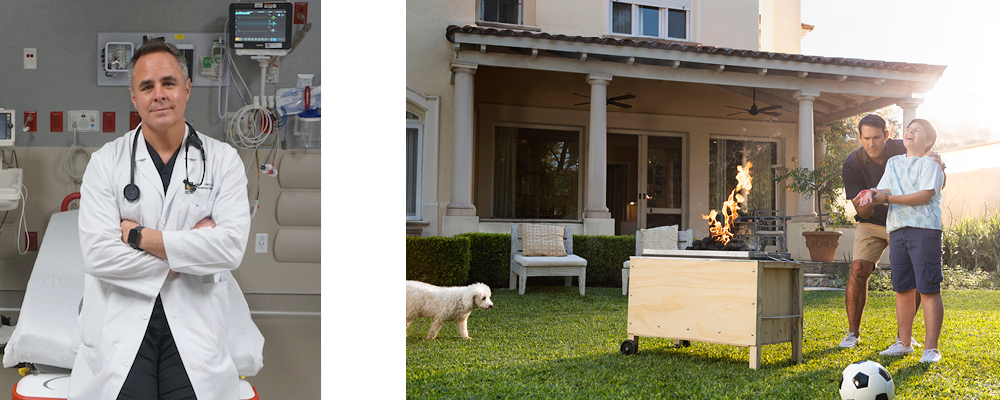Play it Safe When Helming the Grill
By Peter B. Laird
Ahhhh, who doesn’t love the mouthwatering aromas from a backyard BBQ, or the smoky taste of wood-fired meats, seafood and veggies? Here in South Florida, we’re lucky because there is no grilling “season” – we can fire up our backyard barbecues pretty much any time of year.
But like anything else that involves working around fire, grilling can be dangerous. According to the National Fire Protection Association (NFPA), 13 deaths occur every year, on average, and more than 19,000 people wind up in U.S. emergency rooms because of burns suffered while grilling. In addition, an estimated 10,600 structures are damaged every year by fire – most of these caused by gas grills.
Jose F. Llach, D.O., an emergency medicine physician with Baptist Health, says he has treated a number of patients who have suffered burns while grilling, and these injuries can be serious and painful.
“An explosion of a propane tank or a sudden flare-up on a charcoal grill can cause devastating burns that can require multiple skin grafts followed by months of painful therapy,” Dr. Llach says.
Another concern with charcoal grills is the risk of carbon monoxide poisoning. “Never, ever use a grill indoors – it’s not only a fire hazard, but it can also cause carbon monoxide poisoning when those fumes build up in an unventilated area,” says Dr. Llach. He adds that in Florida, where many people live without heat, occasional cold snaps often turn deadly when people resort to using barbecue grills indoors to keep warm.
According to the NFPA, 64 percent of U.S. households have at least one outdoor BBQ, grill or smoker, and 61 percent of all households have a gas grill. “Gas grills contribute to a higher number of fires than charcoal grills,” the organization notes.
Safety Checklist for Outdoor Barbecue Grills
Dr. Llach says safe grilling begins with following safety recommendations from the Consumer Product Safety Commission (CPSC):
- Use grills outside only, in well-ventilated areas and never indoors, in a garage, breezeway, carport, porch or under a surface that will burn.
- Check www.cpsc.gov to see if the grill you’re using has been recalled and follow the remedy if it has been recalled.
- Check your grill and any gas hoses for cracking, brittleness, holes and leaks, and replace them, if necessary.
- Only use appropriate fire starters and only use them before lighting the fire. Never add liquid fuel after trying to start a fire.
- Never leave a hot grill unattended and keep children away from the grill area.
- Clean your grill with a ball of aluminum foil or nylon brushes; avoid wire grill brushes to prevent stray wire brush strands from ending up in the food.
- Keep a fire extinguisher nearby and make sure everyone knows how to use it.
“Everybody loves an outdoor barbecue – it’s all about enjoying great food and having fun with family and friends,” Dr. Llach acknowledges. “Just keep it safe and don’t let a grilling accident land you in the ER.” If you do suffer a serious burn, however – at the grill or anywhere – he says it’s important to seek immediate medical care. “Our emergency departments and urgent care centers are staffed and equipped to properly treat all types of burns.”







![[image]](http://pbg.jcconline.com/ssi/jfed_create_1180x297.jpg)

